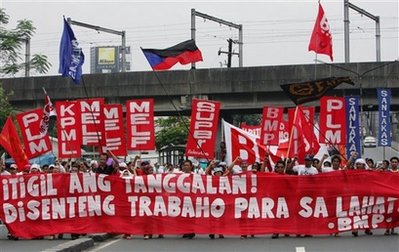Opinion
Workers at
the gates
By BusinessMirror - April 18, 2017
Last Friday (April 7), we organized a picket at the
very gates of Malacañang, going farther than the traditional protests at the
foot of Mendiola Bridge, to ask President Duterte to issue an executive order
that would scrap the latest Department of Labor and Employment (DOLE) order on
contracting, and subcontracting and enact a prohibition against
contractualization.
Dozens of workers dared to pass through Palace
security all over the San Miguel district of the City of Manila; in a defiant
display of resolve against a more-than-two-decade scourge that has wreaked
havoc to the rights and welfare of Philippine labor. It was also a desperate
reminder to Duterte that his promise of “contractualization must stop” and his
mandate of “change is coming” remain unfulfilled.
Ten months have passed in this populist
administration that rode on the people’s disgust over neoliberal policies, such
as contractualization. Yet, nothing has changed, especially in the sphere of
employer-employee relations.
Workers are becoming restless. To the proletarian
millions who voted him into power, the presidential rhetoric to end
contractualization is turning out to be a mere Dutertean electoral gambit to
win the presidency. No wonder his approval ratings at the surveys are falling!
Presidential Spokesman Ernie Abella is proclaiming
the recent DOLE order (DO174) by Secretary Silvestre H. Bello III as the
fulfillment of Duterte’s commitment to end contractualization, a scheme that
the Chief Executive once described as “antipoor”. However, Bello’s DO174 runs
counter to Duterte’s public position against contractualization.
It merely regulates, not prohibit, the contracting
out of labor—even those that are “usually necessary or desirable” in the normal
operations of a business. It also strengthens trilateral employment
relationships, which has now dominated the workplace as opposed to the previous
practices of direct hiring and regularization.
Bello may argue that DO174 is for regularization,
because agency workers could now be regularized under their contractors and
subcontractors. He even described it as a “win-win” solution to the problem.
But what kind of tomfoolery is this?! Regular workers in entities that have
temporary contracts with principal employers! It is not only a contradiction in
terms. It is a unanimous approval of an antiworker scheme, which is patently
designed to create a cheap and docile labor force!
Allow us to explain how parties in
trilateral-employment schemes interrelate with each other:
Who needs labor? The so-called principal employers.
They need the labor of workers to create goods and services that have higher
value than its nonmaterial inputs (materials, depreciation). Labor created such
value-added, from whence comes profit, rent, interest and taxes. They are the
buyers of labor.
Who has labor? The property-less masses. They do
not have any means of subsistence. They only have their brawn, brains, talents
and skill. Because most of their needs and wants are commodities, they are in
constant need for money. They sell their labor in exchange for wages to the
propertied and moneyed few.
What is the role of contractors and subcontractors
in the transaction between the buyer and seller of labor? Nothing but to be a
rent-seeking leech! They act as a “middleman” between the two but pretend to be
the employer of these workers. Their service is to provide cheap labor by
denying seniority benefits for workers upon regular status with the “principal
employers”. Their other purpose is to create a docile labor force that is
perpetually terrorized by unemployment via termination of contract, a threat
that hangs over their heads like the proverbial sword of Damocles.
Furthermore, Bello’s alibi that on the “legality”
of trilateral-employment relationships is not only misleading but also
unacceptably stupid. Duterte should remind his alter ego in the labor
department that Article 106 does not only provide for the regulation of
contracting and subcontracting schemes. It also gives to the labor secretary
the choice to prohibit such schemes in order to protect the workers’ rights and
welfare.
But since it is being made to appear that the hand
does not do what the brain is telling it to do, with Secretary Bello unable to
fulfill the presidential promise to end contractualization, it is but logical
that an executive order be enacted to prohibit contractualization, in
accordance to Article 106 of the Labor Code, and if there is an iota of
sincerity and seriousness in the words of President Duterte.
We urge the readers of this good paper to join us
in this reasonable and just demand.
Leody De Guzman
National President
Bukluran ng Manggagawang Pilipino





